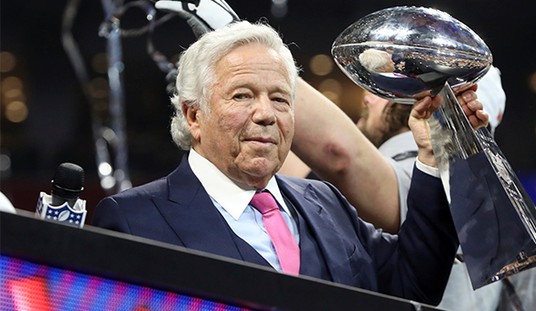Now that Tea Party activists have swung an election, not merely to the Republicans, but to a certain brand of Republicans — those apparently committed to opposing standard-brand go-along/get-along politics — it’s worth remembering that these people are despised by Democrats and media folk in general.
As if we need reminding.
From the very beginning of the Tea Party movement, the judgment of the left has been that Tea Partiers are extremists. Nuts. Wackos. And yet the nutty elements always appeared sparse. The first few peaceful protests surely had far fewer nuts than your average lefty anti-WTO protest.
The first charge against the Tea Party was “racism,” a smear designed to dismiss and marginalize and prevent any further consideration.
And, admittedly, there were signs, here and there among the early protests, expressing racially tinged ugliness. (You probably saw them not at the events but on TV, for television news reports seemed to show the same few signs again and again and again.)
But the main complaints of the Tea Party folk had nothing to do with race, and every honest person knew it. Indeed, the Tea Party protestors that I saw tended to police their own and discourage “racist-looking” placards and such. Most of the worst instances of racism were merely “alleged,” but never recorded. The charge fizzled.
The Tea Party’s actual themes, in case we have forgotten them in the slap-happy self-congratulations of Republican victories, were, in descending order, opposition to a number of recent developments in government:
Recommended
• Bailouts of rich investors, bankers, and creditors in general
• Over-spending by governments
• Increasing government debt
• Nationalized medical care, so-called “Obamacare”
• The failure of government to stem the tide of illegal immigration
Only the latter element had a possible tie to racism. And north of Nevada, Tea Party activists have tended to discourage emphasis of this line-item complaint. Compared to welfare-for-the-rich, constant and increasing deficit spending, and the addition of another underfunded entitlement program (“socialized medicine”), immigration sort of pales as an afterthought.
Every movement has a welter of ideas, but, in the Tea Party, one idea sticks out: It’s the central core message, opposition to big, unlimited government. And that’s what really riles the professional Left the most. But they have trouble articulating their rage against Tea Party rage. And the reason seems clear (though I wish that it were otherwise): Leftists so love big government that even the most reasoned critique of it will seem “extremist” to them, no matter how cogent.
And nothing proves this better than the reflexive opposition to the idea of balancing budgets.
There’s nothing in modern-liberal ideology that says liberals must be committed to never-ending deficit spending and consequent piling up of debt. It is possible to add government services and pay for them by increasing taxes. And, as everyone knows, they do like taxes. High taxes.
But here’s where politics comes in: The Big Government Left, in America, has to deal with the fact that Americans tend to be extremely uncomfortable with big government. Americans seem to object to high taxes (like they object to regulation) more than Europeans do. The country began, after all, as a tax revolt. So, the Big Government Left has compromised. It promises goodies to the people. And it establishes as many hand-outs and bailouts as the people can accept. But it can’t get the people to pay for all this with direct, responsible tax increases. So they borrow.
Their ideology of Big Government doesn’t say anything about deficit spending. They could have a common-sense attitude towards debt. But they sold away their common sense for political influence long ago. They don’t even remember it.
They have painted themselves into a corner.
So no wonder they hate Tea Party common sense. It is a revolt that reaches to the very soul of their movement, and they stand compromised.
One could argue that the Tea Party challenge strikes even deeper at the heart of Big Government conservatives. Republican “conservatives” have even less excuse for going along with over-spending. Deficit spending and debt financing as a way of doing politics has been anathema to conservatives for ages. And yet Republican politicians have enthusiastically embraced this modern compromise — indeed, have forced the compromise — with a certain brittle bravado. And they are all condemned by the Tea Party challenge.
Because we have a two-party system, each side has traditionally blamed the other for the necessity to go overboard and further into debt. Democrats, if they had their way, would raise taxes, so they tend to blame deficits on tax-hating Republicans. Republicans, if they had their way, would lower spending, and so they tend to blame resulting deficits on Democratic big spenders.
But the sad truth is that this picture is more myth than reality.
Republicans have reveled in spending. Reagan may have increased government revenues by lowering marginal tax rates (Laffer Curve in action), but he still pushed for increased spending that went far beyond the revenue that poured in. Bush II’s two-term presidency did the same, and not just because of war: He also increased a major entitlement, pushing through a Medicare expansion (without paying for it).
And it’s not as if Democrats have not ballyhooed their own tax cuts, every chance they get. For it’s not just the Republicans they must compromise with. It’s Americans.
There is blame enough to go around.
What’s required, now, is not blame but a repudiation of the dominant, bipartisan extremism, the extremism that knows no limit to government, no limit to spending, and no limit to the burden we will place on future taxpayers.
And what we need is not just a pro forma repudiation, either. What is required is a repudiation in practice.
There are dozens of issues, little and big, that must be addressed, from earmarks to entitlements. Major reform, you might say. But not “extremist.”

























Join the conversation as a VIP Member